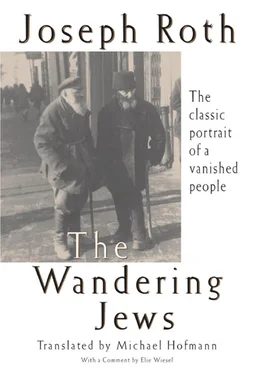I HAD seen them losing consciousness once before, but that was through prayer. It was during Yom Kippur. In Western Europe that gets translated as the “Day of Atonement,” a phrase that reflects the Western Jew’s whole willingness to compromise. But Yom Kippur is a day not of atonement but of expiation, a heavy day whose twenty-four hours contain enough penitence for twenty-four years. It begins at four o’clock the previous afternoon. In an almost entirely Jewish town, this greatest of all Jewish festivals feels just as a great tempest must feel to those in a frail vessel on the high seas. The streets suddenly go dark as candlelight breaks from windows, and the shutters are closed in fearful haste — and so tightly closed that one has the impression they won’t be opened again until Judgment Day. There is a general taking leave of all worldly things: of business, of joy, of nature, of food, of the street and the family, of friends and acquaintances. People who just two hours ago walked the public streets in their everyday clothes, wearing ordinary expressions, hasten through the lanes quite transformed, making for the prayerhouse, dressed in the heavy black silk and dread white of their funeral suits, in white socks and loose slippers, head down, their prayer-coats bundled under their arms. The great silence that now deafens an otherwise almost orientally noisy town oppresses even the lively children, whose shout ing and crying play such a prominent part in the symphony of the streets. All the fathers now bless their children. All the women now weep in front of the silver candelabra. All friends embrace one another. All enemies beg one another for forgiveness. The choir of angels blows a fanfare for Judgment Day. Soon Jehovah will open the great volume in which this year’s sins, punishments, and destinies are recorded. Candles burn now for all the dead. Other candles are lit for the living. The dead are only one step away from this world, as the living are from the next.
The great praying begins. The great fasting has been in progress for an hour already. Hundreds, thousands, tens of thousands of candles burn behind or beside one another, they incline together, they pool in one great flame. From a thousand windows there breaks a wailing prayer, interspersed by soft, mild, otherworldly melodies copied from those of heaven. In all the prayerhouses, the people stand, crowded together. Some prostrate themselves on the ground, lie there for a long time, then get up, sit on footstools or flagstones, hunker there, and suddenly leap to their feet, sway back and forth from the waist, and run around incessantly in the tiny space like ecstatic sentries of prayer. Entire buildings are filled with white funeral shirts, with the living who are absent, with the dead who are alive. Not a single drop is permitted to moisten the parched lips and refresh the dry throats that cry out in so much pain — not to the world but to the heavens. They will not break their fast today or tomorrow. It is a shocking thing to know that not one Jew in this town is going to eat or drink. All have suddenly turned into spirits, with the attributes of spirits. Every little trader is somehow superhuman, because this is the day on which he wants to reach God. All stretch out their hands to touch the hem of his garment. All without distinction: The rich are no better off than the poor, as none of them will have anything to eat. All are sinners, and all pray. A giddiness comes over them, they reel, they rant, they whisper, they hurt themselves; they sing, shout, wail. Heavy tears trickle down their old beards, and their hunger is taken away by so much pain in their souls and by the immemorial melodies that fill their ecstatic ears.
THE ONLY comparable transformation I saw was at a Jewish funeral.
The body of the devout Jew lies in a plain wooden box, covered with a black cloth. It is not wheeled but carried, by four Jews running at a brisk clip along the shortest possible way — I’m not sure whether this is part of the ceremonial or because a slower walk would double the weight for the bearers. They almost race through the town with the corpse. The preparations have taken a day. A body is not allowed to remain unburied for more than twenty-four hours. The wailing of the mourners can be heard all over town. The women run through the streets, crying out their grief to every stranger. They talk to the deceased, call him by his pet names, beg him for mercy and forgiveness, reproach themselves terribly, and ask in bewilderment what they will do without him. They declare that they want to die — and all while running down the middle of the public street — as indifferent faces peer out from windows and other people go about their business, carts trundle by, and shopkeepers offer their wares.
The most shattering scenes take place at the cemetery. Women refuse to leave the graves; they have to be dragged away; they require taming as much as comforting. The melody for the prayer for the dead is of a monumental plainness, the burial ceremony is almost curt in its brevity. Great crowds of beggars scrap for alms.
For seven days the mourners sit in the house of the departed, on the floor, on little stools, walking around in stockinged feet, themselves half dead. In the windows a small, dim light burns in front of a piece of white linen, and the neighbors bring the mourners a hard-boiled egg, suitable food for those whose pain is round, with no beginning and no end.
BUT JOY can be just as violent as sorrow.
A wonder-rabbi was marrying his fourteen-year-old son to the sixteen-year-old daughter of a colleague, and both rabbis’ hasidim came to the celebrations, which lasted for eight days, with six hundred guests.
The authorities had given them the use of an old, derelict barracks. The guests were on the road for three days. They came with carts, horses, sacks of straw, pillows, children, jewelry, and large trunks. They settled into rooms in the barracks.
There was a great commotion in the little town. A couple of hundred hasidim put on old Russian costumes, buckled on old swords, and rode into town bareback. There were some good riders among them, and they gave the lie to all the bad jokes about Jewish army doctors, in which Jews are said to be afraid of horses.
It went on for eight days — the noise, the crowds, the singing and dancing and drinking. I was not admitted to the celebration. It had been put on for the participants and their guests. Strangers milled around outside, peered through the windows, and listened to the dance music, which, in case you were wondering, was good.
Because there are good Jewish musicians in the East. Music is another hereditary profession. Some musicians earn great respect and a local reputation. The true musicians among them have no greater ambition than that. Unable to write music, they compose melodies that they hand on to their sons and sometimes to great parts of the Eastern Jewish people. They compose its folk music. After their deaths, anecdotes about their lives may make the rounds for a further fifty years. Then their names are forgotten, while their tunes continue to be sung and gradually make their way through the world.
The musicians are very poor, because they live off the joys of strangers. They are paid a pittance and are glad if they are allowed to take leftover tidbits and cakes back to their families. They receive tips from the rich guests for whom they play. Following the ineluctable law of the East, every poor man, including therefore the musician, has numerous children. In the musician’s case this is both good and bad, for the sons will go on to be musicians in turn, and form a “band,” which, the bigger it is, the more money it will earn. The more people who bear the family name, the more the band’s renown will grow. Sometimes a later descendant of this family will go out into the world, and become a celebrated virtuoso. There are a few such now living in the West; it would serve no purpose to name them. Not because it might somehow embarrass them, but because it would be unfair to their unknown ancestors, who don’t need to have their greatness confirmed by any talented descendants.
Читать дальше












